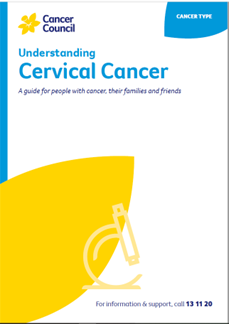- Home
- Cervical cancer
- Diagnosis
- Staging and prognosis
Staging and prognosis for cervical cancer
These tests and procedures help the doctors work out how far the cancer has spread. This is called staging. Knowing the stage of the cancer helps your health care team recommend the best treatment for you.
Cervical cancer is usually staged using the International Federation of Gynecology and Obstetrics (FIGO) staging system. FIGO classifies cervical cancer into 4 stages. Each stage is further divided into sub-stages such as A, B and C, which indicate increasing amounts of tumour.
Learn more about:
Stages of cervical cancer
| stage 1 | early or localised cancer | Cancer is found only in the cervix. |
| stage 2 | locally advanced cancer | Cancer has spread outside the cervix to the upper two-thirds of the vagina or other tissue next to the cervix. |
| stage 3 | locally advanced cancer | Cancer has spread to the lower third of the vagina and/or the tissue on the side of the pelvis (pelvic wall). The cancer may also have spread to lymph nodes in the pelvis or abdomen, or caused a kidney to stop working. |
| stage 4 | metastatic or advanced cancer | Cancer has spread to the bladder or rectum (stage 4A) or beyond the pelvis to the lungs, liver or bones (stage 4B). |
Clinical practice guidelines set out the tests and treatment recommended at each stage of cervical cancer. You can ask your doctors what guidelines they are using.
Prognosis
Prognosis means the expected outcome of a disease. You may wish to discuss your prognosis and treatment options with your doctor, but it is not possible for anyone to predict the exact course of the disease. Instead, your doctor can give you an idea about the general outlook for people with the same type and stage of cervical cancer.
To work out your prognosis, your doctor will consider:
- your test results
- the type of cervical cancer
- the size of the cancer and how far it has grown into other tissue
- whether the cancer has spread to the lymph nodes or other organs
- other factors such as your age, fitness and overall health.
In general, the earlier cervical cancer is diagnosed and treated, the better the outcome. Most early-stage cervical cancers have a good prognosis with high survival rates. Even if cancer is found after it has spread beyond the cervix (locally advanced cancer), it may still respond well to treatment and good outcomes are possible. In recent years, clinical trials have led to new treatments that continue to improve the prognosis for people with metastatic cervical cancer.
Discussing your prognosis and thinking about the future can be challenging and stressful. It may help to talk with family and friends. You can also call Cancer Council 13 11 20 if you or your family or friends need more information or emotional support.
→ READ MORE: Your health care team
Podcast: Tests and Cancer
Listen to more of our podcast for people affected by cancer
More resources
Prof Martin Oehler, Director of Gynaecological Oncology, Royal Adelaide Hospital, and Clinical Professor, University of Adelaide, SA; Dawn Bedwell, 13 11 20 Consultant, Cancer Council QLD; Gemma Busuttil, Radiation Therapist, Crown Princess Mary Cancer Centre, Westmead Hospital, NSW; Dr Antonia Jones, Gynaecological Oncologist, The Royal Women’s Hospital and Mercy Hospital for Women, VIC; Angela Keating, Senior Psychologist, Royal Hospital for Women, NSW; Anne Mellon, Clinical Nurse Consultant – Gynaecological Oncology, Hunter New England Centre for Gynaecological Cancer, NSW; Dr Inger Olesen, Medical Oncologist, Andrew Love Cancer Centre, Barwon Health, Geelong, VIC; Dr Serena Sia, Radiation Oncologist, Fiona Stanley Hospital and King Edward Memorial Hospital, WA; A/Prof Megan Smith, Co-lead, Cervical Cancer and HPV Stream, The Daffodil Centre, Cancer Council NSW and The University of Sydney, NSW; Emily Stevens, Gynaecology Oncology Nurse Coordinator, Southern Adelaide Local Health Network, Flinders Medical Centre, SA; Melissa Whalen, Consumer.
View the Cancer Council NSW editorial policy.
View all publications or call 13 11 20 for free printed copies.

